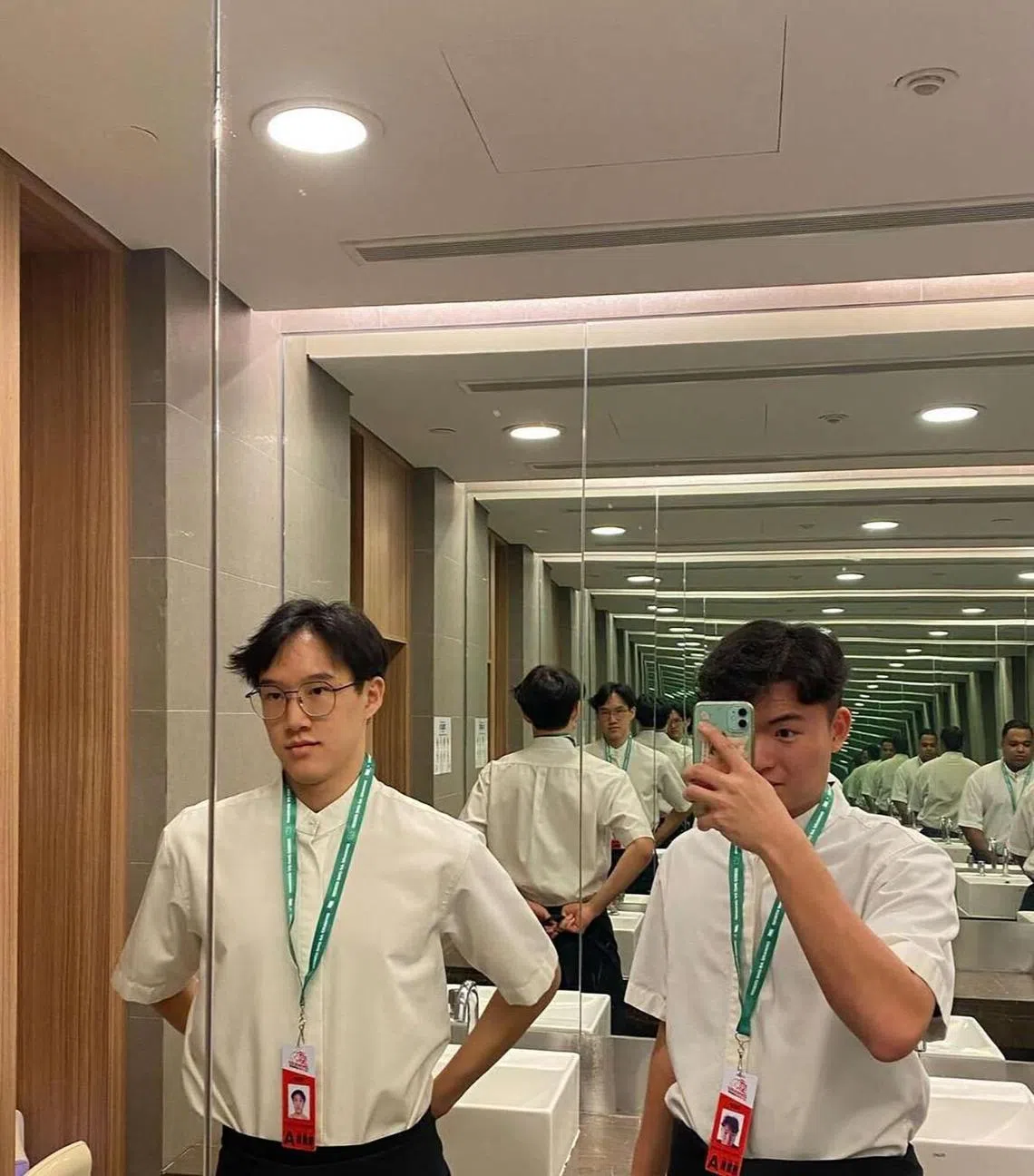Generation Hustle: Why we work
Sign up now: Get tips on how to grow your career and money

(Clockwise from left) Mr Hoh Ron Jun, Mr Adam Erman and Ms Christabelle Low have juggled work with studying for various reasons.
PHOTOS: COURTESY OF HOH RON JUN, ADAM ERMAN AND CHRISTABELLE LOW
SINGAPORE – Today, if you’re a tertiary student with a part-time job, you’re among the 40 per cent of youth in post-secondary education who are juggling work with studying.
Of this group, about half work part-time during the school week, while close to 60 per cent work during the school holidays. Others earn money through creating content or various side hustles.
From helping to ease the financial burdens of their parents, to paying for their hobbies, seven young people tell The Straits Times about the realities behind their front-line part-time jobs.
Why we work
Polytechnic student Masdanial Abdullah, 21, has worked as a server at a juice bar since June 2023.
He said: “My socio-economic status played a big part in my decision. Before I got my job, I didn’t have the luxury of spending on my interests or hobbies, like playing the guitar. It’s not cheap, and my part-time pay has helped me afford my current set-up, which I’ve spent around $3,000 to $4,000 on, contributed to transport, clothing and food fees, and helped my family with some bills.”
As for 19-year-old full-time national serviceman Beck Low, he has worked a variety of jobs from the time he was in Secondary 3 to his second year of junior college. His longest job was as a banquet server at the Marriott Tang Plaza Hotel for a month, serving food and drinks, and attending to guest requests.
“I mainly worked to increase my purchasing power – coming from a family in the lower income bracket, I had to be more financially independent,” he said.
Polytechnic student Adam Erman, 21, still works as a part-time delivery rider, which he started doing after his O levels. It is a convenient gig when he is “in dire need of fast money”, he said, like when he goes out with friends, buys gifts for his girlfriend, or pays for petrol.
“On good days, I earn about $70 and am able to withdraw that money from the delivery app within 48 hours.”
Sixteen-year-old Chen Jia Le’s main consideration when taking on his first part-time job was having money to spare before entering polytechnic.
“My parents told me that (the price of) things, especially food, would be a lot more expensive in polytechnic. They wanted me to work to make some money before I enrolled,” he said. However, finding his first part-time job was not all that easy, as he had no work experience.
Because of that, he was rejected from his first choice of a part-time job as a Uniqlo retail assistant, and settled for the warehouse job as an alternative.
“I was also too lazy to go for any face-to-face interviews, so I only considered jobs with (lower) requirements like this one.”
Keeping a work-study balance
While earning dough was important, students said they had to keep up with their schoolwork too.
Ms Christabelle Low, a 19-year-old polytechnic student who has worked part-time, stuck with her intentions to “prioritise studies as much as possible”.
She took on jobs with a higher commitment level only in her third year of polytechnic, when project work freed up larger blocks of time.
During the school semester, she made a weekly to-do list to keep on top of her academic load, and worked fewer shifts at the peak of the academic cycle, like submission weeks.
When Mr Masdanial first started his job as a part-time food and beverage server, he also had to juggle studying, co-curricular activities, and helping out with chores at home.
When he faced clashes in his schedule, he would prioritise schoolwork and inform his manager that he would be unavailable at peak academic periods.
For three months as a part-time music teacher, 17-year-old Hoh Ron Jun would spend an hour travelling from his polytechnic in Tampines to a guitar centre in Redhill to teach lessons.
“When the second term of polytechnic (started), I struggled to manage my studies and work concurrently. Due to this, I left the centre in order to focus more on my studies,” he said.
Mr Low urged students to “listen to your body and not constantly push its limits”.
“I also think it’s okay for students to pick up a job if they’re strapped for money or if the part-time work value-adds to their portfolio. Otherwise, I think they should take the extra time to discover different fields and start building concrete plans for their post-grad. It’s good to know your long-term goals – you’ll manage your time better and it will help you prioritise the necessary steps to achieve them,” he added.
Jia Le advised tertiary students who are new to the workforce to “not rush into any decisions”. When his warehouse job stint was ending, he had a choice to make.
“I was offered a contract extension but at a lower hourly rate and had to decide on the spot. I excused myself to call my dad. We discussed (it) and decided that it wasn’t a good deal, so I rejected the offer.”

Mr Beck Low (right) – with a colleague, Mr Reuben Man – working as a banquet server for Conrad Centennial Singapore in 2023.
PHOTO: COURTESY OF MR BECK LOW
When the going gets tough
To 20-year-old polytechnic student Muhammad N., his part-time job as a housekeeper for a four-star hotel was “valuable but demeaning”. Fresh from secondary school, he worked for two months while waiting for his O-level results.
He changed bedsheets, emptied and replaced the bags in the dustbin, restocked hygiene products and coordinated room cleaning during his four-hour daily shifts. He said his first part-time job was “worth the experience”, as he had friendly colleagues and reasonable pay.
But it’s not something he would put on his LinkedIn profile or bring up at job interviews, he said.
“I’m afraid my prospective employer will see me differently, so I don’t bring this stint up in a professional setting... unless I have an interest in a related field like hospitality, because the nature of my job wasn’t so hygienic,” he confessed.
Jia Le said that his stint as a warehouse assistant consisted of simple but laborious tasks like carrying heavy products. He said it was a “decent holiday job, as the pay wasn’t bad, but not a good career”.
“Although I got plenty of rest throughout the day, I felt exhausted after work. Physical labour was a tough way to make money, but I managed to lose quite a bit of weight,” he said, adding that he had shed 5kg by the end of his month-long contract.
But it’s not a job to do into one’s 40s and 50s, and is low-paying as a full-time job, he noted.
Not having any other option when he first started out, Mr Adam made his foodpanda deliveries on a fixed-gear bicycle, which made lengthy or uphill deliveries a challenge. Now, he rides a motorbike.

Mr Adam Erman makes deliveries using his motorcycle. He faces challenges like bad weather and difficult customers on top of keeping up with his schoolwork.
PHOTO: COURTESY OF MR ADAM ERMAN
“I also thought the job was just delivering things from point A to point B, but there were more challenges – the weather, unexpected waiting times and difficult customers,” he said.
But it wasn’t all bad, said Mr Adam. Some customers were kind and thoughtful during Ramadan, when he was fasting.
“Sometimes, if my last order was around 7pm and the customer recognised that I was Muslim, they would give dates or a canned drink for me to break my fast,” he said.
“For that reason, I’d do it all over again, even as a cyclist on a (fixed-gear bike). I got to interact with good people, cycle and visit places I’d never thought I’d go to.”


